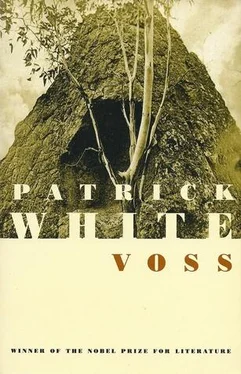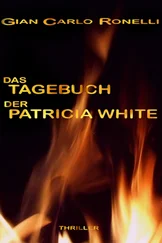When she had dried the paper in its own breeze, and folded, and sealed it, she cried a little, and felt the better for it. She lay on her bed for some time, behind the shutters, in the green afternoon, until the woman came, and asked:
‘Are you not coming down, miss? There are some calls. It has been the wife of Justice Smart, and now it is Mrs Pringle, with Miss Una, in a pale pink bonnet.’
Then the girl, who in the past had barely suffered her maid to touch her, on account of a physical aversion such contact invariably caused, suddenly reached out and put her arms round the waist of the swelling woman, and buried her face in the apron, in the sleeping child, to express what emotion it was difficult to tell.
‘Ah, miss!’ hissed Rose Portion, more in horror over the unorthodoxy of it, than for the stab she experienced in her belly.
Later they would both be glad, but now the girl, realizing she had just done something awkward and strange, jumped up from the bed and began to change into a better dress.
It was Una Pringle, who, seated in the drawing-room on a little, tight-buttoned, slippery chair, first caught sight of Laura through the doorway as she was descending the hall stairs. Down, down, down. Through that, and every subsequent afternoon, of which, it was obvious, she would be the mistress. Una Pringle stopped breathing. She had always hated Laura Trevelyan, and would now hate her more than ever.
BY now the tall grass was almost dry, so that there issued from it a sharper sighing when the wind blew. The wind bent the grass into tawny waves, on the crests of which floated the last survivors of flowers, and shrivelled and were sucked under by the swell. All day the horses and the cattle swam through this grass sea. Their barrels rolled and gurgled. All night the beasts were glutting themselves on dew and grass, but in the dreams of men the waves of grass and the waves of sleep were soon one. Dogs curled in pockets of the grass, shivered and bristled as they floated on their own dreams.
It was the dogs that first confirmed the German’s opinion that they must be in the vicinity of Jildra. On a certain evening, as the expedition continued to advance, the dogs had begun to whine, and gulp, and lift their legs repeatedly. Their muzzles had grown leaner, the eyes were bulging from their skulls, when, with very little further warning, suddenly foreign tails, then the bodies of foreign dogs were emerging from the grass. Thus having come together, the two parties of animals were stalking round and round, in stiff, shocked silence, awaiting some sign.
The members of the expedition had shaded their eyes with their hands, as an extension to the already broad brims of their hats, and eventually one of them, Mr Judd it was, remarked that he could see a man approaching on horseback above the waving grass. Other eyes were soon focused on this figure, who came on through the red light, firmly clamped by the thighs to the body of his strong, chestnut horse. As he advanced, erect, moving in the saddle just enough to emphasize the arrogance of ownership, it was disclosed that the man himself was of a reddish, chestnut colour, intensified by the evening sun.
There he was, at last, reining in. The suspicious horse snorted.
‘Boyle is my name,’ announced the man, on thick lips, holding out a hand that did not waver.
‘Of Jildra,’ added Voss.
‘That is correct.’
No further civilities were expended on the meeting, but Mr Boyle turned his horse and proceeded to escort the party along the track he had made by his coming. The band of sweating horses, straight mules, lowing, heavy-headed cattle, and parched, tingling men went on towards Jildra. By the time the homestead was reached, the western sky was of a blood red. The foreground had almost foundered, through which ran the figures of a number of individuals, if they were not animated, black sticks, to receive the reins from the hands of the new arrivals. Smoke was ascending, and dust fom the broad road the animals had trampled, together with the vapours of night. All was confused, nor did the approaching unity of darkness promise great consolation.
Mr Brendan Boyle was of that order of males who will destroy any distinction with which they have been born, because it accuses them, they feel, and they cannot bear the shame of it. In consequence, the station-owner had torn the boards off Homer to chock the leg of the table, and such other books as he had inherited, or even bought in idealistic youth, now provided material for spills, or could hope at best to be ignored, except by insects, dust, and mould. In his house, or shack of undaubed slab, that admitted day-and starlight in their turn, several pieces of smooth Irish silver stood cheek by jowl with pocked iron, the former dented somewhat savagely, in reprisal it seemed, for elegance. The dirt floor was littered with crumbs and crusts of bread. Birds and mice could always be relied upon to carry off a certain amount of this rubbish, but some lay there until it became petrified by time, or was ground to dust under the hard feet of those black women who satisfied the crude requirements of Brendan Boyle.
‘This is my mansion,’ indicated the latter, waving a lantern so that the room rocked, and the dimples which came when he spoke flickered on either side of his mouth. ‘I suggest that you, Mr Voss, and one or two others, peg your claims here on the floor, and allow me the pleasures of conversation, while the rest of the party enjoy the luxury of their own tents. There are plenty of blacks here, bustin’ themselves with meat and damper, who will lend a hand. Here, Jem, where the deuce,’ he grumbled, and shouted, and went outside, causing the whole neighbourhood of grass and trees frantically to rock in that same disturbed lantern-light.
Voss and Palfreyman, who were left standing in the skeleton shack, in the smell of old, hard bread and that morning’s ash, did not regret that this was the last hospitality civilization would offer them.
Later, when these two had shared with their host a lump of salt beef and some cold potatoes, which a pair of shrieking black women, naked as the night, had set on the table’s edge, he proceeded to make the conversation he craved, or rather, to disgorge out of his still handsome throat chunks of words, and opinions he was not used to confess to other men in all that vastness.
‘It is ten years now since I came to this something country,’ said Brendan Boyle, swilling the rum, to which he seemed addicted, from an ugly, iron pannikin. ‘I have done nicely,’ he said, fascinated by the eddies in his pot of rum, ‘as nicely as most people, and will do better; yet it is the apparent poverty of one’s surroundings that proves in the end to be the attraction. This is something that many refuse to understand. Nor will they accept that, to explore the depths of one’s own repulsive nature is more than irresistible — it is necessary.’
He had opened the shirt on the hair of his chest, and had sat forward, and was holding his head in his hands, and was twitching with his mouth to release the words, or some personal daemon.
‘To peel down to the last layer,’ he yawned. ‘There is always another, and yet another, of more exquisite subtlety. Of course, every man has his own obsession. Yours would be, it seems, to overcome distance, but in much the same way, of deeper layers, of irresistible disaster. I can guarantee,’ he said, stabbing the table with two taut fingers, ‘that you will be given every opportunity of indulging yourself to the west of here. In stones and thorns. Why, anyone who is disposed can celebrate a high old Mass, I do promise, with the skull of a blackfeller and his own blood, in Central Australia.
‘High Harry!’ he laughed, more for himself, and added, in a sigh: ‘Ah, dear!’
Читать дальше












